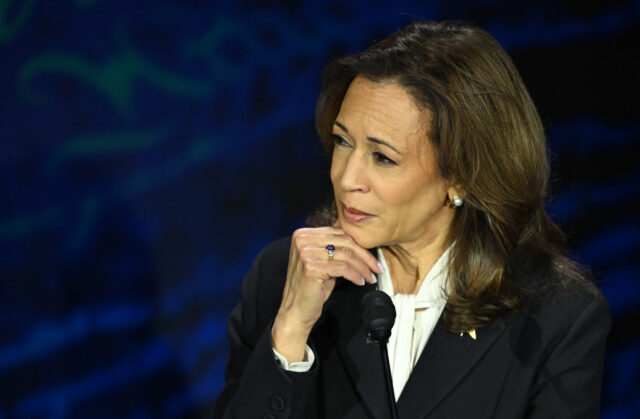Claim: Kamala Harris on Tuesday night accused Donald Trump of proposing a national sales tax.
Harris referred to a “Trump sales tax” and claimed it would add 20 percent to the cost of goods.
Verdict: False.
President Trump has not proposed a national sales tax.
Harris was likely referring to Trump’s proposal to raise tariffs on imports. Tariffs are paid by companies that import goods from abroad and not by consumers. They are not a sales tax.
Studies of the tariffs Trump imposed during his 2017-2021 term have shown that some of the cost of tariffs ultimately fell on importers and some fell on the exporting countries. The tariffs were not passed through to consumers and did not act as a tax on households, as the low level of consumer inflation during the Trump years shows.
Tariffs do not tend to raise consumer prices. As Mary Amiti of the Federal Reserve Bank of New York’s Research and Statistics Group, Princeton University’s Stephen Redding, and Columbia University’s David Weinstein wrote in one of the most widely cited studies of Trump’s tariffs, “trade theory has long stressed that tariffs applied by a large country should drive down foreign prices.” (That study was not friendly to tariffs, by the way. It concluded that U.S. firms paid for most of the tariffs. But it did not find that the tariffs were passed through from businesses to households.)
As Breitbart Business Digest explained on Monday:
When Trump came into office on a promise of tearing up international agreements and imposing tariffs, many of his critics were quick to claim the president was starting a trade war. Establishment economic forecasters on the left and right confidently predicted that Trump’s tariffs would hurt the U.S. economy and raise consumer prices.
Eight years ago, these claims were at least plausible on their face. It had been generations since the U.S. had invoked a muscular trade strategy that included broad tariffs rather than just piecemeal tariffs on products that were illegally being dumped into U.S. markets. The anti-tariff crowd did not have much evidence to support their claims, but it had been so long since we had used trade tariffs strategically that there was not all that much direct evidence on the other pro-tariff side either.
What Trump had on his side was economic theory. You would not know it from the way many economists talk about tariffs, but standard economic theory supports Trump’s claim that tariffs are often paid for by the country whose exports are subject to the increased duties and not by the country importing the goods. Trade theory has long found that tariffs applied by a large economy such as the U.S. tend to drive down foreign prices, as exporting nations have no other choice to offload their excess production.
In fact, it’s long been known to economists that imposing a tariff can improve the terms of trade so much that domestic prices of imported goods subject to the tariff actually fall. This is known as the Metzler Paradox after economist Lloyd Metzler who first wrote about the idea all the way back in 1949. What’s more, by increasing the incentives to invest in domestic production, the tariffs can increase global output of the tariffed goods, which also puts downward pressure on prices.
Price theory also tells us that tariffs are unlikely to raise consumer prices. Although many people imagine that the prices they pay at the cash register are an accumulation of the costs of their inputs, the reality is pretty much the opposite. Consumer demand determines the price of the final product, which then determines the prices of the components and labor that go into making the product. So, when a tariff raises the cost of imports, in a competitive economy there’s no real way for merchants to pass on the cost.
In any case, imports make up only a small portion of consumer purchases so even if the cost of tariffs were passed through to consumers, the effect would not amount to a national sales tax.
There were similar claims that tariffs would raise consumer prices when Trump imposed tariffs in 2019 but consumer prices did not rise.

COMMENTS
Please let us know if you're having issues with commenting.